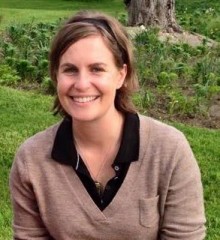CERES and the Petro Jacyk Program for the Study of Ukraine (PJP) are pleased to welcome Dr. Jessica Zychowicz as this year’s PJP Post-Doctoral Fellow. Dr. Zychowicz will be teaching a course entitled “Gender and Society in Modern Ukraine” (more information below).
Dr. Zychowicz received her Ph.D. in the Department of Slavic Languages and Literatures at the University of Michigan, and was affiliated with the Center for Russian, East European, and Eurasian Studies, the Institute for Research on Women and Gender, and the Center for Research on Learning and Teaching (with a certificate in digital humanities). Her dissertation, “Superfluous Women: Gender, Art and Activism After Ukraine’s Orange Revolution,” explored how aesthetic exchanges between artists, activists, and their audiences rhetorically frame the body in public discourse. Primary texts include visual art, performances, interviews, digital and news media by several contemporary Ukrainian art collectives, including the controversial women’s group Femen. The study offers a transnational critique of how aesthetics and politics come to be inscribed in civic vocabularies on feminism, gender, and human rights that translate unevenly and shift over time. Ongoing research interests include the global media production of discourse on women, the idea of collectivity in avant-garde movements, the state and its relationship to art, and culture industries in the context of public diplomacy. Recent publications include articles in the Anthropology of East Europe Review; Krytyka: The Journal for Ukrainian Politics and Society; and a chapter in Holmgren, Lipovetsky, and Hashamova’s Transgressive Women in Modern Russian and East European Cultures: From the Bad to the Blasphemous. Dr. Zychowicz has also translated book-length translations of creative works accompanying avant-garde photography, drawing, and painting by contemporary Ukrainian authors, and periodically writes general-audience pieces on current issues in women’s and gender rights in the context of global affairs. She received her B.A. in English Literature from the University of California Berkeley in 2004 and served a full term as a Peace Corps volunteer in Ukraine from 2005-2007.
Gender and Society in Modern Ukraine
This course introduces key readings in Gender and Women’s Studies and Area Studies alongside canonical works in East- Central European Literature and History. Secondary sources for the course draw upon anthropology, sociology, visual art, and popular culture. The course’s central questions investigate how societies in Ukraine dealing with extreme economic and political flux have shaped unique cultures of artistic and political expression. Comparative sites for analysis include Russia, Poland, Hungary, the Czech Republic, and former Yugoslavia. Students will examine the historical breaks and continuities between shifting national regimes, exploring how the mythologies that underpin gender roles are produced and reinforced. State censorship and other social restrictions placed on free speech under communism frame selected readings. The course consists of three papers grounded in close readings of specific texts, and culminates in a final presentation, in which students are asked to apply the comparative analytical skills they have acquired to specific case studies from each paper.
The format of the course is divided into three units. In the first segment, students will learn about the organization of society under communism and the cultural responses, adaptations, and negotiations of state policies by groups from different ethnic, racial, gendered, and national backgrounds. The history of socialist realism in state affairs and the development of public cultural institutions after 1917 will be emphasized. Unit two will focus on comparative differences between Ukraine and countries in the Eastern Bloc due to the impact of WWII on culture and society. The impact of changing attitudes toward war and technology throughout the USSR, for example, will be examined in the context of shifting labor practices due to material shortages and heightened censorship regimes through the end of Stalinism. Unit three will examine Glasnost and the fall of the USSR in 1991, with a focus on official/unofficial responses to regime change. The radical economic and social flux that arose at the time lead to a parallel surge in subcultural expressions in music and art on both sides of the Atlantic, an outcome that has largely continued into the present day. The final part of the course culminates in readings featuring East-West exchanges that reflect this continuity, posing questions about gender and free speech, and what these terms might mean for the future of democracy.
No knowledge of foreign languages is required. All readings and lectures will be conducted in English.
